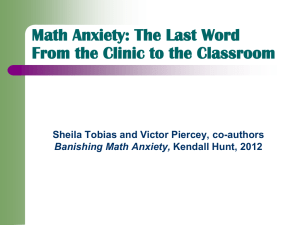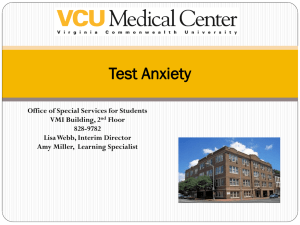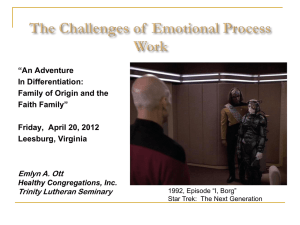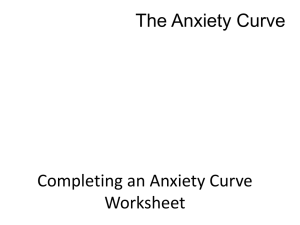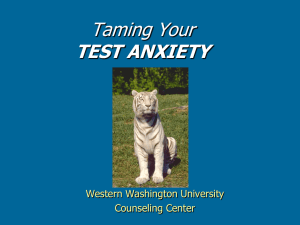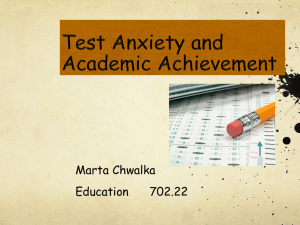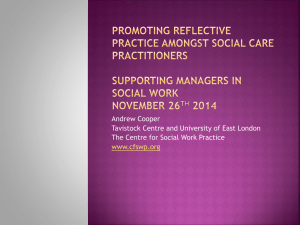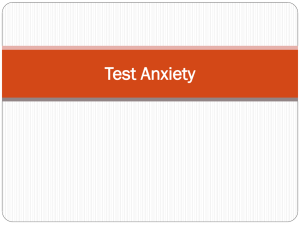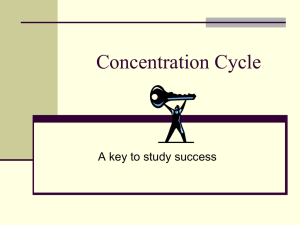Effective Study Techniques
advertisement
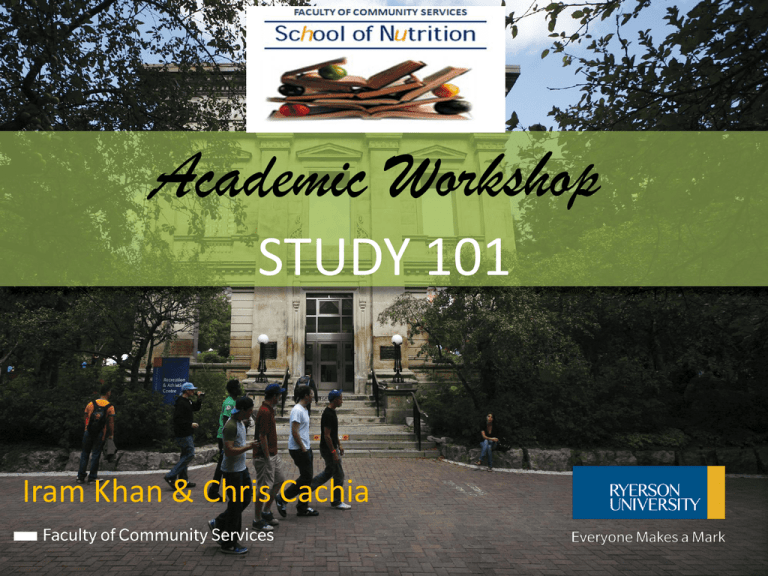
Academic Workshop STUDY 101 Iram Khan & Chris Cachia Agenda ● Getting to know us, you, and each other: Self-Assessment Activity ● Introduction to Time & Task Management: Time & Task Management Activity ● Keys to Academic Success (Stations and Digging Deeper): 1. Critical Reading & Writing 2. Effective Study Techniques 3. Test Performance & Anxiety ● Resources and Contact Information Getting to know us, you, and each other ● What is a Learning Strategist? ● Self-Assessment Activity… ● As a group: Do you already know of any strategies you use to maximize your strengths and address your challenges? Time and Task Management I ● 1. Scheduling: 4 month/term calendar; weekly calendar ● 2. Prioritization: What am I scheduling? How am I scheduling? ● Dump out everything that you feel you need or have to do; dump out everything you feel you would like to do or would enjoy doing ● Sift priorities… ●Try dumping and sifting for the week… Time and Task Management II ● 3. Manage Interruptions: Ask yourself, is this interruption an immediate task? Can it wait? Does it help me reach my priorities? ● 4. Procrastination: recognize and figure-out WHY ● 5. Goal-Setting: Re-assess and revise to be realistic “Keys to Academic Success” 1. Critical Reading & Writing 2. Effective Study Techniques 3. Test Performance & Anxiety Introduction to Critical Reading Reading to acquire knowledge • Reading to increase understanding • Reading to critically analyze information • Reading skills • Finding articles • Introduction to The Writing Process • Pre-writing • Outlining or planning • Drafting • Writing mechanics • Revising and editing • Citation Keys to Academic Success: Critical Reading and Writing ● In groups, you will spend approx. 10-15 minutes investigating your critical reading folder (red) ● Self-regulate working through supplied resources ● As a guide, use the following “digging deeper” questions… Critical Reading & Writing: Digging Deeper How would you define critical reading and critical writing? What is the difference between descriptive and critical writing? • What are the KWL and SQ3R methods of reading? • What are some pre-writing strategies you can name and describe? • Critical Reading Strategy: SQ3R • Survey – using objectives, topic sentences, visual cues • Question – based on objectives, topic sentences, summaries, visual cues • Read – to answer (and ask more) questions • Recite – and write • Review – in different ways (using effective study techniques!) The Writing Process Strategy: Free-Writing Write your topic at the top of the page Start writing; write as quickly as you can Write down everything that comes to mind Keep writing, do not go back, do not correct or cross anything out • Build your stamina! • • • • Introduction to Effective Study Techniques • Memory – flash cards, mnemonics etc. • Self-test – practice questions, online quizzes • Content support – tutoring, TA, professor • Visual Organizers – charts, diagrams, mind maps Keys to Academic Success: Effective Study Techniques ● In groups, you will spend approx. 10-15 minutes investigating your effective study techniques folder (blue) ● Self-regulate working through supplied resources ● As a guide, use the following “digging deeper” questions… Effective Study Techniques: Digging Deeper • What are mnemonics and what is an example of a mnemonic device? What are other ways you might use to remember material? • How might you create and review using flash cards? • What is a concept map? How might you use concept maps in your courses? Effective Study Techniques Strategy: Concept Maps Introduction to Test Performance & Anxiety • Approaching Questions • Multiple Choice • Short Answer/Essay • Managing Stress • BRAVO • PEARL Keys to Academic Success: Test Performance & Anxiety ● In groups, you will spend approx. 10-15 minutes investigating your test performance & anxiety (black) ● Self-regulate working through supplied resources ● As a guide, use the following “digging deeper” questions… Test Performance & Anxiety: Digging Deeper • How might you approach writing multiple choice questions and tests? How might you approach writing essay questions and tests? • What are the effects of cramming? How might you avoid cramming? • What are some common indications of test-related anxiety? What are some strategies you can use to manage test-related anxiety? What is BRAVO? Test Performance & Anxiety Strategy I: Types of Questions • Multiple Choice: answer before checking choices; mark possible answers; test answers • Essay Questions: be clear on what is being asked (analyze? contrast? discuss? prove?); use a rough outline; make a clear point (thesis? organizing statement?); be conscious of weighting Test Performance & Anxiety Strategy II: BRAVO • Breath – and have a pre-test routine • Review – and plan before writing • Answer – after actively reading the question • Verify – that you followed instructions • Oversee – and remember, this isn’t your last test! Resources: Time and Task Management 4 Month/Term Planner: http://www.ahutton.com/plncntrl/images/4MO-small-screen.jpg Weekly Calendar: http://studentsuccess.mcmaster.ca/images/pdf/academic_skills/onlineresources/weekly_schedule_template.pdf Managing Time and Tasks: http://services.unimelb.edu.au/academicskills_old/study/TimeTaskManagement On Procrastination: http://www.youtube.com/watch?v=Qvcx7Y4caQE#t=50 Assignment Calculator: http://news.library.ryerson.ca/assignment-calculator/ Resources: Critical Reading and Writing 7 Critical Reading Strategies: http://www.salisbury.edu/counseling/new/7_critical_reading_strategies.html ON KWL: http://www.studygs.net/texred3.htm On SQ3R: http://www.studygs.net/texred2.htm Critical Reading Towards Critical Writing: http://www.writing.utoronto.ca/advice/reading-and-researching/critical-reading 3 Pre-Writing Strategies for Any Project: http://blog.writeathome.com/index.php/2011/08/3-prewriting-strategies-for-any-writing-project/ What is Critical Writing?: http://www2.le.ac.uk/offices/ld/resources/writing/writing-resources/critical-writing Resources: Effective Study Techniques Effective Habits for Effective Study (Self-Assessment Tool): http://www.studygs.net/attmot4.htm Memory Tips: http://prc.housing.ubc.ca/files/brochure_-_memory_tips.pdf On Flash Cards: http://www.ryerson.ca/content/dam/studentservices/accesscentre/pdf/Memory%20Strategy %20Step%203%20Flash%20Cards.pdf On Concept Maps: http://ctl.byu.edu/tech-tips/concept-mapping How to Organize and Conduct Effective Study Groups: http://ctl.byu.edu/single-article/how-organize-and-conduct-effective-study-groups Resources: Test Performance & Anxiety Exam Success – Top Tips From Brilliant Blogs: http://theuniversityblog.co.uk/2008/03/27/exam-success-top-tips-from-brilliant-blogs/ Test-Taking Advice for the Multiple-Choice Challenged: http://members.shaw.ca/daprof/testtaking_advice.htm Answering Short Answer and Essay Exam Questions: http://www.uwlax.edu/biology/communication/answeringessayquestions.htm The Exam Cram – Why Stress Can Hurt Your Test Scores: http://columnfivemedia.com/work-items/course-hero-infographic-the-exam-cram%E2%80%94-why-stress-can-hurt-your-test-scores/ On Managing Test Anxiety: http://ub-counseling.buffalo.edu/stresstestanxiety.php//ubcounseling.buffalo.edu/stresstestanxiety.html Our Contact Information Iram Khan iram.khan@ryerson.ca Chris Cachia ccachia@ryerson.ca FCS Drop-In and Resource Centre fcs.support@ryerson.ca LIB 272K

